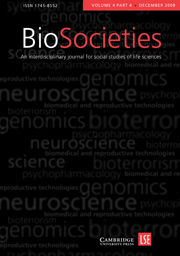Article contents
Can Science Alone Improve the Measurement and Communication of Race and Ethnicity in Genetic Research? Exploring the Strategies Proposed by Nature Genetics
Published online by Cambridge University Press: 25 October 2006
Abstract
The long-standing concerns about the measurement and communication of race and ethnicity in genetic research have spilled over into the editorial columns of a growing number of biomedical journals. Nature Genetics has played a prominent role in this debate with a series of editorials published between 2000–2004, culminating in the publication of an open-access Special Issue (Genetics for the human race) in November 2004. The Special Issue brought together contemporary research on the relationship between race, ethnicity and genetic variation, and a range of views on the social and ethical implications of this research. In this article we analyse interviews with each of three the editors in charge of Nature Genetics during this period to show that scientific concerns related to the measurement and communication of race and ethnicity in genetic research had been responsible for making this a ‘special issue’ for the journal. Two broad strategies for tackling these concerns were identified from an analysis of contributions to the Special Issue: continuing to use racial and ethnic categories until such time as these become obsolete; or replacing racial and ethnic categories with alternatives based on socio-cultural and geographical ancestry. We also identified additional suggestions for improving the communication of genetic findings disaggregated by race or ethnicity, which were: developing guidelines for measurement and interpretation; and greater ‘community engagement’. We argue that neither of the broad strategies and neither of the suggestions for improving communication can be wholly effective. We suggest that this is because these proposals do not adequately confront the notion that race and ethnicity are difficult concepts to operationalize or examine in scientific research precisely because they have meanings and uses which exist beyond the domain of scientific practice or control.
Information
- Type
- Articles
- Information
- Copyright
- 2006 London School of Economics and Political Science
- 15
- Cited by

